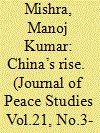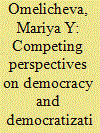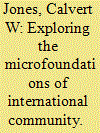|
|
|
Sort Order |
|
|
|
Items / Page
|
|
|
|
|
|
|
| Srl | Item |
| 1 |
ID:
136482


|
|
|
|
|
| Summary/Abstract |
Western Sahara is rich in phosphates and natural resources, a main reason Morocco has summarily annexed it. In doing so, however, Morocco has ignored the rights of the Sahrawis, fighting a silent war for independence over the last 40 years. Hannah Rae Armstrong examines how Morocco has illegally exploited the territory for its resources and argues that if the international community does not respond, the Sahrawi may be forced to take up arms once again.
|
|
|
|
|
|
|
|
|
|
|
|
|
|
|
|
| 2 |
ID:
134833


|
|
|
|
|
| Summary/Abstract |
Al-‘Eizariya (Bethany) is one of East Jerusalem’s eastern neighborhoods located on the historic Jerusalem-Jericho route, two miles from Jerusalem. The reality of al-’Eizariya has changed dramatically in the last two decades. After the Oslo Accords (1993) were signed, al-‘Eizariya expanded to accommodate the flood of migrants who arrived due to an economic boom and the political expectation that it would be part of the future capital of the state of Palestine. All this economic growth has since been disrupted by the failure of the Oslo Accords1 and the construction of the Separation Wall beginning in 2002.2
|
|
|
|
|
|
|
|
|
|
|
|
|
|
|
|
| 3 |
ID:
136333


|
|
|
|
|
| Summary/Abstract |
The idea of pacifism dates back to the comprehensive social reforms that were introduced after Japan’s surrender in World War II. The U.S.-led occupying forces carried out a series of democratization and demilitarization policies in a bid to establish a government that would respect other countries and embrace the UN Charter. The U.S. wanted a Japan that would no longer pose a threat to them and to international peace and security. Those policies soon led to a breakdown of Japan’s old systems. In contrast to militarism during the pre-war period, Japan’s U.S.-led social reforms were peaceful. With the gradual evolution of policy adjustments, Japan gradually achieved rapid economic growth and regained recognition from the international community. It apologized for its war-time aggression. Pacifism was widely accepted by the Japanese people and it laid a foundation for Japan’s peaceful development. And so pacifism became part of the Japanese society’s system of values.
|
|
|
|
|
|
|
|
|
|
|
|
|
|
|
|
| 4 |
ID:
135345


|
|
|
|
|
| Summary/Abstract |
It is widely recognised that the Anglo-American ‘special relationship’ fluctuated following the Second World War. A “Persistent rivalry” was especially evident in policy towards the Middle East and its oil. Immediately after the war, the American attitude to Palestine seemed to complicate British policy. Events in Iran also reflected the clash between the British imperative to protect its national and imperial interests in the region on the one hand, and the American preoccupation with the Cold War and containment on the other. The subsequent differences over Egypt/ Nasser are a matter of public record as are the problems which arose over the British withdrawal from “East of Suez”. Perhaps the very closeness of the relationship between the UK and the US served to heighten expectations.
|
|
|
|
|
|
|
|
|
|
|
|
|
|
|
|
| 5 |
ID:
136593


|
|
|
|
|
| Summary/Abstract |
During the summer of 2014, the U.S. government once again offered the State of Israel unwavering support for its aggression against the Palestinian people. Among the U.S. public, however, there was growing disenchantment with Israel. The information explosion on social media has provided the public globally with much greater access to the Palestinian narrative unfiltered by the Israeli lens. In the United States, this has translated into a growing political split on the question of Palestine between a more diverse and engaged younger population and an older generation reared on the long-standing tropes of Israel’s discourse. Drawing analogies between this paradigm shift and the turning point in the civil rights movement enshrined in Mississippi’s 1964 Freedom Summer, author and scholar Robin Kelley goes on to ask whether the outrage of the summer of 2014 can be galvanized to transform official U.S. policy.
|
|
|
|
|
|
|
|
|
|
|
|
|
|
|
|
| 6 |
ID:
134536


|
|
|
|
|
| Summary/Abstract |
After more than three years of corrosive wars, Syria no longer exists as a nation-state. It has been replaced by disparate entities and precarious arrangements – to the detriment of the Syrian population. The ‘Divided States of Syria’ are in large part the result of the survival strategy of the regime, aided by the futile pursuit of a ‘political solution’ by the international community. As the tragedy deepens, the recovery of Syria becomes more difficult, and the implications for regional stability increase in gravity. The West – the United States in particular – has abstained from forceful engagement. Yet, the price to pay today may in retrospect pale in light of the political, strategic and moral catastrophes that the current reserved approach is enabling.
|
|
|
|
|
|
|
|
|
|
|
|
|
|
|
|
| 7 |
ID:
136283


|
|
|
|
|
| Summary/Abstract |
China’s economic growth and military modernization has led to a serious debate in the international community as the weather China would remain an important stakeholder. While many scholars and political leaders in the US saw a threat in China’s rise, Chinese scholars have tried to portray China’s rise as peaceful rise.
|
|
|
|
|
|
|
|
|
|
|
|
|
|
|
|
| 8 |
ID:
135942


|
|
|
|
|
| Summary/Abstract |
The Second National Communication (SNC) on Climate Change of the People’s Republic of China was submitted to the Secretariat of the United Nations Framework Convention on Climate Change (UNFCCC, hereinafter referred to as the Convention) in November 2012[①] and was released to the international community. The second part of the communication was about China’s GHG inventory in 2005. This was the third time China officially released its GHG data after the release of GHG data of 1994 in Initial National Communication on Climate Change of the People’s Republic of China (INC) in 2004[②] and data of 2004 in National Climate Change Programme (NCCP) in 2007[③]. And this was also the first time China officially released the base year data after its 2020 CO2 mitigation target was announced in 2009 before the Copenhagen Conference, attracting wide attention from the international community.
|
|
|
|
|
|
|
|
|
|
|
|
|
|
|
|
| 9 |
ID:
137088


|
|
|
|
|
| Summary/Abstract |
This study examines alternative understandings of democracy and democracy promotion advanced by the US, EU, Russia and China in Central Asia using frame analysis. In the context of this study, ‘frames’ refer to the relatively cohesive sets of beliefs, categories and value judgements as well as specific ways in which these ideas are packaged for the targets of international democratization. The study assesses the implications of alternative representations of democracy promotion and competing models of governance for the prospects of democratization in Central Asia. It concludes that the substance of US and EU democracy promotion in Central Asia has neglected the cultural and political contexts of these states, while the Russian and Chinese models of governance and development have provided a better match to the interests of the ruling elites
|
|
|
|
|
|
|
|
|
|
|
|
|
|
|
|
| 10 |
ID:
136412


|
|
|
|
|
| Summary/Abstract |
Following the announcement on November 24, 2014, that Iran and the P5+1 (China, France, Germany, Russia, the United Kingdom, and the United States) were extending the Vienna talks on Iran’s nuclear program, pressure has been building in Washington and Tehran against the negotiations. Domestic opposition in both countries has been empowered by this delay. Some in the U.S. Congress have even called for an end to the negotiations or threatened new sanctions
|
|
|
|
|
|
|
|
|
|
|
|
|
|
|
|
| 11 |
ID:
137085


|
|
|
|
|
| Summary/Abstract |
In contrasting UN with EU democracy promotion discourses, the article contributes to the debate on the substance of EU democracy promotion by approaching the question of ‘democratic substance’ from the vantage point of sovereignty. For its analytical framing, it draws on relevant aspects of Foucault's work on power. The article suggests that, due to their diverging obligations to sovereignty, the substance of democracy promotion in UN discourses revolves around an institutional-centric understanding, whereas in EU discourses we see a significant reconceptualization of democracy as a norms-based concept. The latter does not aim at the government of society but the ethical self-governance of socially embedded individuals. It is argued that, with the decreasing purchase of democracy as a universal political project and the growing concern with local contexts, the EU's norms-based conception emerges as better equipped to adapt to contemporary challenges of governing. The article concludes with raising some doubts about the democratic promise and potential of the democratic rationality underpinning EU discourses. Democracy, participation and political change are no longer conceived in terms of shaping and influencing public agenda but refer to socially shaping and influencing subjective perceptions and behaviours.
|
|
|
|
|
|
|
|
|
|
|
|
|
|
|
|
| 12 |
ID:
135911


|
|
|
|
|
| Summary/Abstract |
Bahrain is one of the only countries where, four years into the “Arab Spring” uprisings, most people continue to use peaceful methods of resistance, including technological advancements and the use of social media for mobility. Over time, political stalemate, impunity, and the closure of most avenues for peaceful dissent caused many individuals to become disenchanted with the results of these nonviolent tactics, turning instead towards more violent means of protest. Inside Bahrain, opposition groups used the people’s dedication to nonviolence to better position themselves. In addition, international responses to violent strategies elsewhere in the region have led to foreign military intervention, greater political attention in international forums, and more consistent coverage in mainstream media outlets. The use of peaceful dissent also suffers from a lack of international legal protection and regulation. The lack of regulation left those suffering from grave human rights violations as a result of peaceful dissent with few avenues that could provide more protection and accountability. Through the lens of the Bahraini protests, this article analyzes how the strategy of using nonviolence to create social and political change has been undermined and almost obliterated due to the lack of international legal structures to protect peaceful protesters from their governments, as well as the double standards apparent in the response of the international community.
|
|
|
|
|
|
|
|
|
|
|
|
|
|
|
|
| 13 |
ID:
134682


|
|
|
|
|
| Summary/Abstract |
This article reviews power transition theory and emerging threats to U.S. national security. It then analyzes how the 2014 QDR will ensure U.S. relative power decline and how the strategy fails to effectively counter the rise of China and Russia as challenger states in the international system. Finally, several policy options are proposed to address the deficiencies of the QDR and to counter an increasingly aggressive China and revisionist Russia.
|
|
|
|
|
|
|
|
|
|
|
|
|
|
|
|
| 14 |
ID:
134538


|
|
|
|
|
| Summary/Abstract |
In spite of geographic proximity and a number of shared interests, the European Union and Libya have a history of strained relations. The war of 2011 provided an opportunity for a fresh start, but so far neither side has been able to reap benefits from an entirely new political situation. Instead, Libya’s difficult internal situation has not only slowed down the process of rapprochement, but also increased EU concern. At a time when cooperation becomes a necessity rather than a choice, Libya is now down-spiralling into implosion at the levels of security, bureaucracy and economy, to the point where it cannot absorb the offers being made.
|
|
|
|
|
|
|
|
|
|
|
|
|
|
|
|
| 15 |
ID:
134537


|
|
|
|
|
| Summary/Abstract |
Seen through the eyes of Syrian activists and other observers based in the Middle East, EU policy towards Syria could in some ways appear inconsistent and ambiguous. In Brussels, EU representatives remind us that the Syrian crisis is the most difficult one the European Union has had to face so far, for the unprecedented scope of the humanitarian catastrophe, its geographic proximity to the Union’s borders, and the difficulties in deciphering a fluid and multi-dimensional conflict. After more than three years since the eruption of violence, the EU is trying hard to play a pivotal role in the Syrian issue, despite the complexity of balancing its institutions, the different political sensibilities of its 28 member states, and the pressures exerted by influent external actors.
|
|
|
|
|
|
|
|
|
|
|
|
|
|
|
|
| 16 |
ID:
134508


|
|
|
|
|
| Summary/Abstract |
The Euro-Arab Dialogue (EAD) was established by the European Economic Community in 1974 as a way of improving bilateral relations between Europe and the Arab world in the wake of the October 1973 Arab-Israeli War and the subsequent global energy crisis. This article examines the success of the EAD in its first three years in existence (between 1974 and 1977). It begins with an analysis of the literature on the framework in these years. Much of this material argues that the EAD was a success in achieving its goal of improving relations with the Arab world as well as evidence of the success of the recently established European Political Cooperation (EPC) framework in general. This article challenges this view and instead argues that the EAD, even in its early years, was not a success due to three factors: the first was the failure of the EEC to keep the EAD focused on economic issues and to prevent the politicization of the framework; the second was the Community's inability to come to grips with the deep internal divisions over both the mandate and goals of the EAD; and the third was American hostility towards the EAD from the time of its birth.
|
|
|
|
|
|
|
|
|
|
|
|
|
|
|
|
| 17 |
ID:
136605


|
|
|
|
|
| Summary/Abstract |
This paper challenges conventional wisdom about the drivers of international community at the individual level. Presenting new data and a novel natural experiment approach to the study of cross-border contact and international community, it tests some of the key microfoundations of international relations theory about how a sense of shared international community may arise and evolve among individuals. The hypotheses are tested using survey data from a large sample (n = 571) of American study abroad students in a range of universities across a treatment and a control group. Surprisingly, findings do not support the main hypothesis that cross-border contact fosters a sense of shared international community. However, the second hypothesis drawn from the liberal paradigm, suggesting that cross-border contact lowers threat perceptions, is strongly supported. The “Huntingtonian” hypothesis that cross-border contact heightens nationalism also garners wide support. The paper concludes with a discussion of the implications for theory and future research, especially the potential of rethinking the drivers of international community at the individual level to rely less on a sense of shared identity and essential sameness, and more on a feeling of “enlightened nationalism” and appreciation for difference
|
|
|
|
|
|
|
|
|
|
|
|
|
|
|
|
| 18 |
ID:
136410


|
|
|
|
|
| Summary/Abstract |
The Iranian nuclear issue has long vexed Tehran’s political and economic relations with the international community. The talks between Iran and the P5+1 (China, France, Germany, Russia, the United Kingdom, and the United States) on Tehran’s nuclear program entered a transformative phase after Iranian President Hassan Rouhani, with the backing of Supreme Leader Ayatollah Ali Khamenei, appointed a new team to lead the Iranian delegation
|
|
|
|
|
|
|
|
|
|
|
|
|
|
|
|
| 19 |
ID:
136817


|
|
|
|
|
| Summary/Abstract |
The strong motivated ISIS is a indirectly, the creation of International Community. Had the international community taken early step and forced al-Assad to step down by supporting his democratic opponents, this monster would not have been there. Policies persuaded by the powers like Russia, China and America perpetuated the autocratic rulers al Assad in Syria and this made the entry and position of ISIS strong.
|
|
|
|
|
|
|
|
|
|
|
|
|
|
|
|
| 20 |
ID:
134666


|
|
|
|
|
| Summary/Abstract |
Today, we gather here in Beijing to commemorate the 60th anniversary of the Five Principles of Peaceful Coexistence. An international law colloquium specially dedicated to the Five Principles is the first of its kind as far as I can remember. In that sense I believe this event is of special and far-reaching significance.
|
|
|
|
|
|
|
|
|
|
|
|
|
|
|
|
|
|
|
|
|